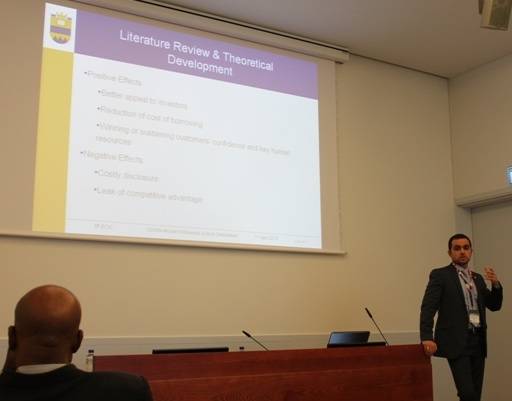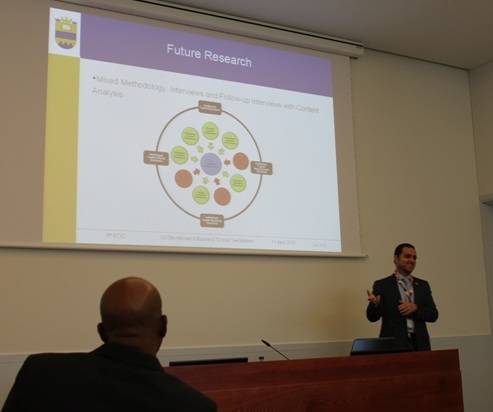It is with great pleasure that the University announces that D.Phil. Finance Candidate George Majdalany has presented two papers at the ECIC13 conference, the 5th European Conference on Intellectual Capital, held in Barcelona, Spain the 11th & 12th of April, 2013.The first paper is entitled, “”The Effect of Intellectual Assets and Intellectual Liabilities Disclosure on Financial Performance: An Empirical Analysis of Publicly Listed Companies in the United Arab Emirates”. The second paper is entitled, “The Impact of Corporate Governance Indicators on Intellectual Capital Disclosure: An Empirical Analysis from the Banking Sector in the United Arab Emirates”. The paper has been completed under the watchful supervision of Dr. Muhieddine Ramadan, the Regional Dean for the Gulf for UGSM-Monarch Business School Switzerland. The abstract is found below.

ABSTRACT – Intellectual Assets & Intellectual Liability Disclosure
Financial reporting is an important, crucial task for achieving and sustaining a well-organized, farsighted business. Furthermore, investor demand for relevant information and improved quality and timeliness of financial information is increasing in the face of deteriorating usefulness of traditionally reported earnings, cash flows, and equity values. Intellectual Capital (IC) is connected either directly or indirectly to recent economic, technological, managerial, and sociological developments. Thus, many accounting industry practitioners, analysts, and researchers now see IC as a driver for a firm?s long term business competitiveness and ultimately both non-financial and financial performance. However, most researchers have overlooked the negative side of IC which is referred to as Intellectual Liabilities (IL). Therefore, little research has been done on IL. Thus, the objective of the present study is to understand how Intellectual Assets (IA) and IL components influence financial performance; this understanding leads to better resource allocation which eventually promotes better firm performance. Th research is designed as an empirical study of the relationships between IA and IL disclosure and financial performance for publicly listed companies in the United Arab Emirates (UAE). The research question asked is: ?What are the characteristics of a new conceptual model that assists in explaining the relationships between IC disclosure and firm financial performance for companies listed on the UAE stock exchanges?? In terms of practical implications, the present study provides a framework for the relationship between IA, IL, and financial performance. In addition, the existing body of knowledge in this field, which shows conflicting opinions concerning the correlation between IC and financial performance, will be enriched as a result of the developed original framework within a new marketplace and geography thereby bringing increased intellectual attention to the critical issues defining the subject matter.
ABSTRACT – Corporate Governance Indicators
Corporate governance is a framework for legal, institutional, and cultural factors shaping the patterns of influence that stakeholders exert on managerial decision making. Managerial decision making is focused on creating value for stakeholders through competent uses of capital and accurate disclosure and communication of a firm?s resources. However, established management and reporting systems have gradually lost their relevance due to their inability to capture and provide important information for stakeholders in order to manage processes that are based on knowledge and intangible resources. Besides, it has been claimed that in the present knowledge economy, Intellectual Capital (IC) is a major driver of competitive advantage, innovation, and performance due to its ability to capture information which is not reported in traditional financial statements. Therefore, the aim of the present study is to explore through empirical analysis the impact of Corporate Governance on IC disclosure (ICD) in annual reports issued by the banking sector in the United Arab Emirates (UAE). The present study examines the influence of Corporate Governance indicators (bank size, leverage, profitability, board size, and ownership structure) as independent variables on the disclosure of IC elements (Human Capital, Relational Capital, Structural Capital) as dependent variables, while controlling for market listing age and bank age. The methodology employed is quantitative, using multivariate regression analysis to study the relationship between Corporate Governance indicators and ICD, which is measured using content analysis of the 2010 annual reports of publicly listed banks in the UAE. The present research has some limitations, which include the specificity of Corporate Governance proxies used, examination of only the 2010 annual reports, and generalization restriction inherent in the examination of the UAE markets alone. The present study has a theoretical implication, by providing an empirically tested conceptual model on the relationship between Corporate Governance and ICD in the banking sector of the UAE. In addition, it has a practical implication by providing information for regulating agencies to develop regulations aiming to increase the implementation of Corporate Governance practices incorporating IC elements.


